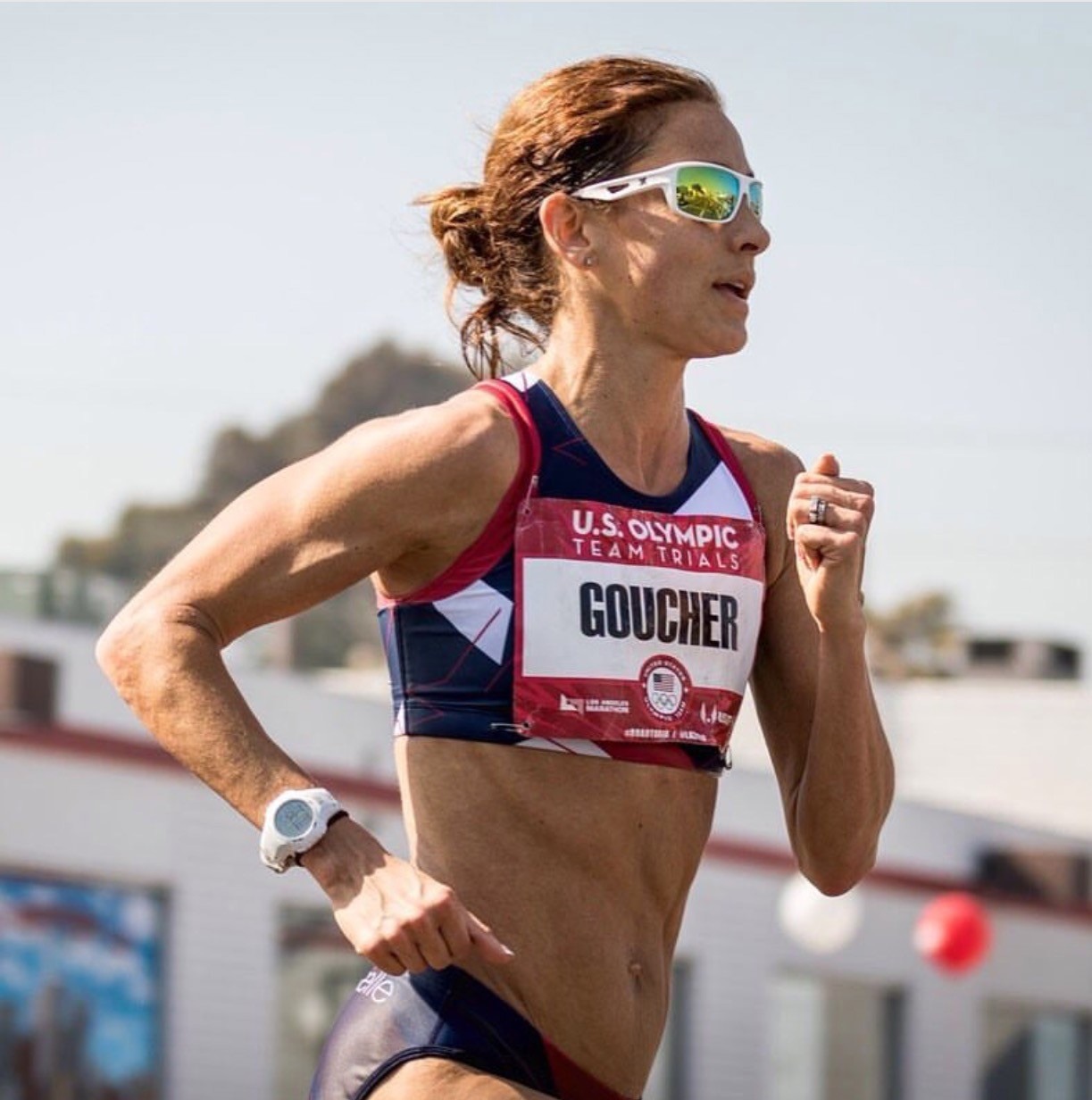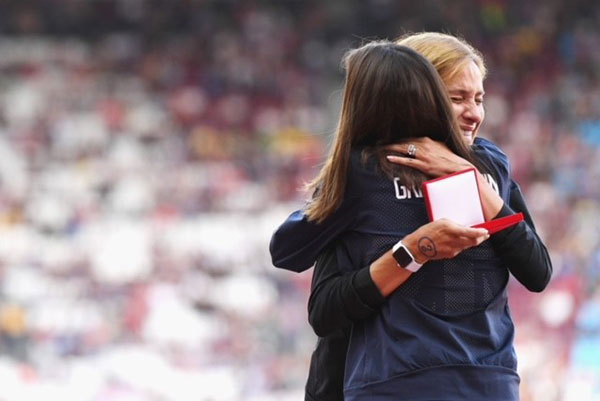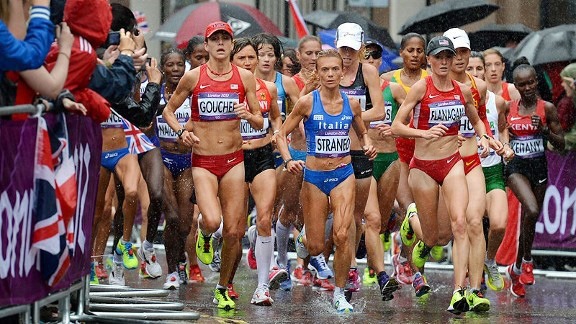Few people understand what it takes to stand up for clean sport like Kara Goucher, the long-distance runner who put values before ambition when she became a whistleblower in 2013. Kara also knows that success in elite sport can be achieved through talent and hard work when clean athletes are given the opportunity to compete on a level playing field.
A two-time Olympian, she was first known for winning the first ever American medal in the women’s 10,000 meters at the 2007 IAAF World Outdoor Championships in Osaka, Japan. This bronze medal was later upgraded to silver after her competitor was disqualified for doping. Kara also achieved two historic podium moments with third-place finishes at the 2008 NYC Marathon and the 2009 Boston Marathon.
Kara recently spoke with USADA about her ongoing fight for clean sport and why it’s important for all those who believe in the integrity of sport to take a stand.
Q: You were an elite level track and field athlete for more than 15 years. During that time, you not only fought for your running career, but clean sport as well. How do you feel about running now? Do you still love the sport?
Kara Goucher:
I definitely still love the sport. I think it’s kind of come full circle. I fell in love with running for how it made me feel and the friendships that it built. I loved competing…and then I saw kind of a darker side, but now I see hope. I’m back to running for the reasons why I started running, just the joy of it and the competition and the friendships. I still am crazy about running.

Q: Having competed at the highest level of the sport for so long, have you seen an evolution in track and field over the years when it comes to a level playing field?
Kara Goucher:
I think that we are getting closer and closer. I get a sense of athletes really wanting change, demanding change. I didn’t see this at the beginning of my career. I think we kind of put our heads down and we went with the flow and nobody wanted to ruffle any feathers. But I do feel like now athletes are banding together and just saying we deserve more…and we deserve to be on a level playing field. I feel like people got more vocal and comfortable talking about it. I feel like it has evolved quite a bit the last few years.
Q: You mentioned that the clean sport movement has been growing, but how has anti-doping been received in the running community as far as the testing and those components?
Kara Goucher:
Honestly, in the community that I’m in, we love the testing. We don’t think it’s a problem. I had an app on my phone that reminded me, every day, this is where you’re going to be. I think for us it’s not a big deal. We are happy to be tested. We don’t think it’s invading in our privacy at all. The community that I’m in, we’re all for it and we welcome more testing even!
For us, we are pumped when USADA shows up. A lot of us will tweet about it. We’re excited and happy. For us, it’s a happy thing when it happens.
Q: But that might not be the feeling of all athletes?
Kara Goucher:
It’s kind of surprising…honestly, it’s not hard. It really is as easy as it can be. Even back in the days where I was faxing my data in, I still had no problem with it.
Q: How has doping in track and field impacted your career and your opportunities in the sport?
Kara Goucher:
 It’s impacted my career quite a bit. Obviously, the most well-known example for me is in Osaka 12 years ago now, at the World Championships. I finished third and then found out eight years later, after the retest of our samples, that the woman who finished in front of me for the silver medal tested positive for steroids. I was upgraded two years after that…so 10 years after the fact.
It’s impacted my career quite a bit. Obviously, the most well-known example for me is in Osaka 12 years ago now, at the World Championships. I finished third and then found out eight years later, after the retest of our samples, that the woman who finished in front of me for the silver medal tested positive for steroids. I was upgraded two years after that…so 10 years after the fact.
When I look back at my career, there’s so many moments along the way. I ended up specializing in the marathon, where there were women who later tested positive, and we would change the way we were actually running the race to try to take the sting out of them or to try to take their kick out. If they weren’t in the race, the entire race would have played out differently. Maybe I ran races that weren’t to my strength to try to take out their strength instead of running to my own strength.
There’s so many layers to it. Even as simple as, one of my first years as a professional, I was the first person to not make it to the final of the 1500 meters at the U.S. championship. Later, there was a U.S. woman who was found to be taking drugs and she was there. So, instead of feeling so disappointed that I didn’t make the final, I would have made the final and that would have helped jumpstart my career. It was at the very beginning of my career and that was really important.
There’s so many little things along the way. I think sometimes people don’t understand how much one person can dictate the way you run a race and how that really can change all of the results all the way down the board. So, it’s kind of frustrating to think about.
Q: Do you think runners are generally competing on a level playing field at this point?
Kara Goucher:
I do think it’s gotten better each year. I think this past year we’ve seen a lot of performances that … I’m an American, so I always view it from the American standpoint, but we’ve had a lot of American women “breaking through.” But really they’re just doing what they’ve been doing and now it’s on a more level playing field, so the results are bigger. We’re winning medals and winning majors in the marathon. That’s really exciting.
For me, it’s like they’re not doing anything unbelievable. They’re doing what they did before, but because I think the playing field is more level, they’re actually able to snag that medal. They’re actually able to snag that world marathon major win.

Q: How did you feel after the 2018 Boston Marathon, which American Desiree Linden won?
Kara Goucher:
I was so excited to see Des win. I just think she is a champion. She’s true to herself. She’s true to her sport. She has been outspoken about supporting clean athletes. If you know Desi’s story and know it was her sixth time racing and know how much she cares about that race – I mean her dog’s named Boston – it was just really cool to see her win and to have her be the one that ended that drought. It was very, very exciting. I was very emotional.
Q: What do you think are the most important factors when it comes to ensuring clean sport, whether it's education, support personnel, testing, whatever that might be?
Kara Goucher:
I think that all of those things are important. I think education is super important. I think the younger we talk to kids about the pressures in sport and the challenges that they’re going to have to face, the more equipped they’re going to be when they face those situations.
And just educating, even professional athletes, on ‘you can’t just take a supplement off the shelf.’ So many people don’t know that. And educating on ‘What is a TUE? Why do you have to have it? What is the actual Prohibited List? How can you find out if what you’re taking is prohibited or not?’ These are things that to me seem obvious, but to a lot of people, it’s not.
I think starting with the youth and really preparing them, and then once you get into the testing pool … I feel like our education once you’re in the testing pool is quite good. You have to watch a video which really breaks everything down. You have to take a test to prove that you understand. I think once you’re in the testing pool it’s good. I think education is really important. I think educating everyone around the athlete, the doctors, the coaches, and the agents is important.
Testing is super important. We can never take away testing, even though athletes have figured out ways to sort of circumvent the results and stuff. But it’s so important, because without testing there’s no fear of getting caught, so then people are just going to do it. Testing is super important.
And I think sanctioning is really important. People need to be sanctioned and not just the athletes. We’ve seen a lot of athletes sanctioned and their coaches walk away and then they get another athlete who then gets caught in a sanction. I think we need to start looking outside the bubble of just the athlete and seeing the support personnel, the coaches, and the agents who constantly have athletes test positive. They should be facing sanctions as well.
I don’t think there are very many athletes who grow up and they’re like ‘You know what, I can’t wait until I get good enough that I can take drugs.’ It’s someone in a trusted position who comes to them that pressures them, or over time, gets them to that place. I just think if those people are held accountable, that’s when we’re going to see the biggest difference.
Q: Based on your experience as a whistleblower and a clean sport advocate, where do you think there's room for improvement in anti-doping and building a culture of clean sport?
Kara Goucher:
I have to say, as someone who is a “whistleblower,” USADA has been great to me and to the other people involved in the situation I’m involved in. I would love to see a little bit more support from our governing bodies, from USA Track and Field and from the IAAF.
USA Track and Field has never reached out to myself or anybody else involved in the case that I’m involved in. The IAAF has made some public statements about supporting whistleblowers, but no one from the IAAF has ever reached out to any of us either. That sends a message that you don’t really care. It makes me feel like I’m not really welcomed. I feel very supported by USADA, but I think we need to kind of branch out and say if we truly want to clean up our sport, as a Federation we need to look at our sport and ask why are we not helping people who have seen things that they reported. We should be at least contacting them and getting their story and helping them report it to the proper channels.
Q: In the last couple of years, what are some of the other ways you have stood up for clean sport? The the Clean Sport Collective is part of that, right?
Kara Goucher:
As you get older, you’re like ‘What can I do? Could it be more?’
Obviously, I’ve been very outspoken, but some people around me wanted to do more and so they came up with this idea of the Clean Sport Collective. I am not on the Board or anything, but I’m just a person who spreads the message of it. It’s just a way for everyday people to take a stand.
 They take this pledge that they’re only going to support clean athletes. They’re only going to use their purchasing dollars wisely and purchase from companies that support clean athletes. It’s just a way for people to feel like they can actually help and they can be part of the change by being vocal, by using their dollars wisely, and by joining this group of people who really want to see more positive strategies and more positive change.
They take this pledge that they’re only going to support clean athletes. They’re only going to use their purchasing dollars wisely and purchase from companies that support clean athletes. It’s just a way for people to feel like they can actually help and they can be part of the change by being vocal, by using their dollars wisely, and by joining this group of people who really want to see more positive strategies and more positive change.
Q: Do you see yourself doing anything else like that in the future too?
Kara Goucher:
Yeah. I don’t know exactly what my role looks like, but I’ll never stop fighting for clean sport.
It’s been, to be honest, a very tough battle to fight. Having that medal awarded to me 10 years later, I never thought that I was robbed from the medal in Osaka, so it never crossed my mind until I found out. That was a life changing moment. I want everybody else who has had an experience like that to have that wrong righted. I won’t stop fighting for it. I don’t know what that looks like, but I’m always going to be vocal and I’m always going to be there to help in any way I can.
Q: So, thinking about other athletes, how they can get involved? What do you think is the most effective way to advocate for fair play these days?
Kara Goucher:
I think using your voice and using your purchasing dollars. Join the Clean Sport Collective. Take the pledge. Be vocal. If an athlete is thinking about speaking out, be supportive. Don’t shun them. Raise that athlete up. Give them a platform to speak on. Keep demanding change. Write to the IAAF. Be vocal with what you want.
If you want to see a country banned because they don’t have any testing, then ask for it. The more people say ‘This is crazy. How can athletes compete when they’re not being drug tested?’ The more likely it is that we’re actually going to see some changes and they will listen. If enough people raise their voices, they will listen.
Again, just use your purchasing dollars wisely. We see companies continually signing athletes who have had bans…don’t spend your money with them. Take your money elsewhere. That’ll send a message to them. Eventually they’ll have to say ‘Wait, we’re losing a lot of business now. We need to think about what we actually stand for.’
Q: What's your advice to athletes who do want to do more for clean sport? Why is it worth it?
Kara Goucher:
It’s easy to pick on one person when one person is speaking out…to say that they’re jealous, or they’re bitter, or whatever. But, when you start to line up and all of a sudden you have a wall of people saying ‘No, this is not okay. This is what I saw’…you’re really making change. We’re actually seeing change right now. We’re seeing people really have consequences. That’s because people are standing up and telling what they know.
When I finally went to USADA with what I knew, it was because I felt like in a weird way I was enabling their behavior and that was such a bad feeling. After I went to USADA, I didn’t feel that way anymore. I’m free of it. I don’t have to carry that around anymore.
Just know that you are not alone. There’s so many people who believe you, who will support you. You’ll just join this club of people who’ll have your back and help you throughout the whole process.
Q: Do you have anything else that want to share?
Kara Goucher:
Just that, even though I know there’s a problem in sport, it’s still worth doing. We’re still doing it. I just love running so much. I can’t go back in time about these races that might have turned out a different way, but they were still amazing experiences.
I just don’t want people to be so discouraged. We will fight and we will never stop fighting, but still go out there and dream and keep competing.

Read more Spirit of Sport blog posts



